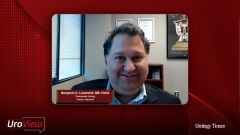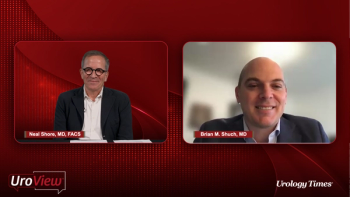
AR-targeted therapies for mCSPC
Various factors that medical oncologists consider when selecting to treat metastatic castration-sensitive prostate cancer with either apalutamide or enzalutamide.
Episodes in this series

Benjamin H. Lowentritt, MD, FACS: That’s really helpful in setting the table here. Today, we’re going to talk mainly about 2 of the indications, both metastatic castration-sensitive prostate cancer [mCSPC]—the patient who presents with metastases, either de novo or after recurrence—and then nonmetastatic castration-resistant prostate cancer in just a bit. When you talk about androgen receptor [AR] inhibitors for the patient with mCSPC, this is a critical area in regard to recognizing when to hand it off if you’re not going to do this. We’re seeing so much benefit for these patients with earlier recognition and earlier institution of therapy, so it’s really important to be aware of these things. But you have both apalutamide and enzalutamide that have an indication for the patient with metastatic castration-sensitive disease.
These indications arrived in 2019 for the most part, and we’ve now seen a couple years of follow-up data and final analyses. I don’t know that we have to spend a whole lot of time on all of the individual trials. To be a little provocative here, we’re always discouraged from comparing differences between trials, like a couple of tenths of a hazard ratio, or if they were collecting data differently. But when we think about the TITAN and the ARCHES trials, which for apalutamide and enzalutamide respectively, were the big trials that led to approval in this space, I’m curious if you see any differences or anything that guides you in your therapy.
One of the things that I always found interesting was from the get-go, you had the signal for overall survival from apalutamide in the first analysis. Why was it so clear with one and not the other? I’m curious, do you distinguish much between these agents? How do you choose between those two? Even in other discussions with other drugs, how do you factor some of these differences in trials into your thoughts?
Julie N. Graff, MD: Thank you, Ben. The truth is you get used to one of the AR antagonists and you use it because it’s the one you’re used to and know a lot about. I think of apalutamide and enzalutamide as being very similar. The end points on these trials were a little different. One of them was rPFS, or radiographic progression-free survival. The other had more of an overall survival end point. I think of them as pretty much interchangeable. I don’t think one is better than the other. People who use these medications should remember that apalutamide can decrease the thyroid function and cause rash. Those are different from enzalutamide. Both drugs can cause profound fatigue. We should also remember that in the metastatic hormone-sensitive or hormone-naїve setting, there are options of chemotherapy with docetaxel and abiraterone therapy.
It’s a tight field. I don’t know if you’re ready to hear it, but there are all these new data coming out looking at docetaxel followed by androgen receptor antagonists or abiraterone, and saying that it’s better to use both chemotherapy and hormonal therapy. It’s funny in oncology how excited we were to drop docetaxel in 2010 when we got newer treatments, and now we picked it up again for CHAARTED, which focused on newly diagnosed metastatic high-volume disease. Now we’re picking it up again and are probably going to give all the therapies up front.
Benjamin H. Lowentritt, MD, FACS: Yes, it’s interesting. The ENZAMET trial didn’t really suggest it. We weren’t sure if it was going to be proven that sequential or combination was going to be better. That wasn’t really what it was looking at. It did show the effectiveness of enzalutamide to some extent, but it was a bit of a question. But I agree, the emerging data that are starting to come out on some of these other trials are really exciting for where we can be. It makes sense to me. The strategy for most cancers is to try to address it from multiple different mechanisms, and early if possible, to try to get it knocked down as much as possible. We’re not talking about cure for many of these patients, but anything we can do to prolong survival is really meaningful.
Transcript edited for clarity.
Newsletter
Stay current with the latest urology news and practice-changing insights — sign up now for the essential updates every urologist needs.







